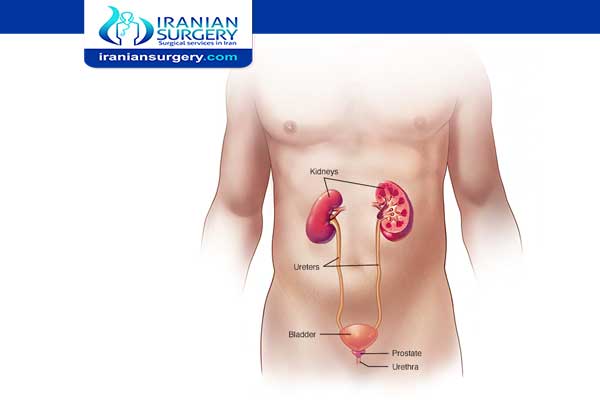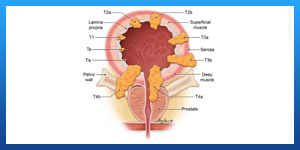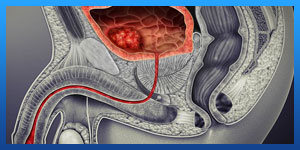Bladder cancer symptoms in men

Bladder Cancer Symptoms
Symptoms of Bladder Cancer
Many people with bladder cancer can have blood in their urine but no pain while urinating. There are a number of symptoms that might indicate bladder cancer like fatigue, weight loss, and bone tenderness, and these can indicate more advanced disease. You should pay particular attention to the following symptoms:
. Blood in the urine
. Painful urination
. Frequent urination
. Urgent urination
. Pain in the abdominal area
. Pain in the lower back
Read more about : Late symptoms of bowel cancer

Read more about : Bladder Cancer treatment
Read more about : What is Bladder Cancer?
Read more about : Orchiectomy surgery for prostate cancer
Read more about : Kidney stone
Most often, bladder cancer is diagnosed after a person tells his or her doctor about blood in the urine, also called hematuria. "Gross hematuria" means that enough blood is present in the urine that the patient can see it. It is also possible that there are small amounts of blood in the urine that cannot be seen. This is called "microscopic hematuria," and it can only be found with a urine test.
General urine tests are not used to make a specific diagnosis of bladder cancer because hematuria can be a sign of several other conditions that are not cancer, such as an infection or kidney stones. One type of urine test that can find out whether there is cancer is cytology, a test in which the urine is studied under a microscope to look for cancer cells.
Sometimes when the first symptoms of bladder cancer appear, the cancer has already spread to another part of the body. In this situation, the symptoms depend on where the cancer has spread. For example, cancer that has spread to the lungs may cause a cough or shortness of breath, spread to the liver may cause abdominal pain or jaundice (yellowing of the skin and whites of the eyes), and spread to the bone may cause bone pain or a fracture (broken bone). Other symptoms of advanced bladder cancer may include pain in the back or pelvis, unexplained appetite loss, and weight loss.
If you are concerned about any changes you experience, please talk with your doctor. Your doctor will ask how long and how often you’ve been experiencing the symptom(s), in addition to other questions. This is to help figure out the cause of the problem, called a diagnosis.
If cancer is diagnosed, relieving symptoms remains an important part of cancer care and treatment. This may be called palliative care or supportive care. It is often started soon after diagnosis and continued throughout treatment. Be sure to talk with your health care team about symptoms you experience, including any new symptoms or a change in symptoms.

Read more about : Urinary Incontinence
When to see a doctor
If you notice that you have discolored urine and are concerned it may contain blood, make an appointment with your doctor to get it checked. Also make an appointment with your doctor if you have other signs or symptoms that worry you.
Make an appointment if you have any of these other symptoms:
. You have to pee more often than usual.
. Your urine changes color.
. It hurts or burns when you pee.
. You feel like you have to pee -- even if your bladder’s not full.
. You can’t pee, or you pee very little.
. You can’t pee, even when you feel like you have to.
. Your lower back hurts.
. You’re losing weight without trying.
. You’re not as hungry as usual.
. You have swollen feet.
. Your bones hurt.
. You often feel extremely tired or weak.
Read more about: Pancreatic cancer
Read more about: Prostate Cancer Treatments Pros and Cons
Read more about: Bladder Cancer Staging
Read more about: bladder stone

